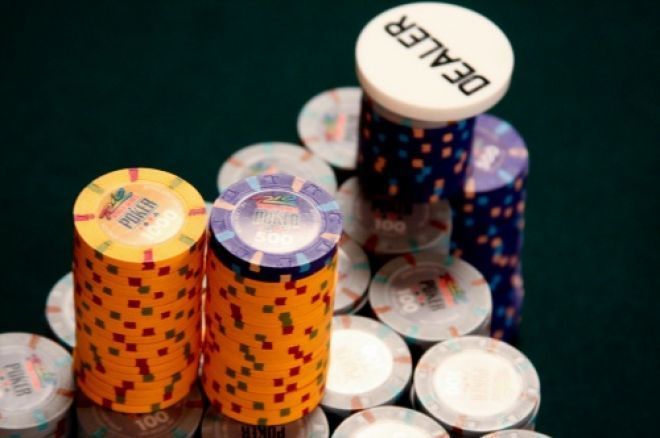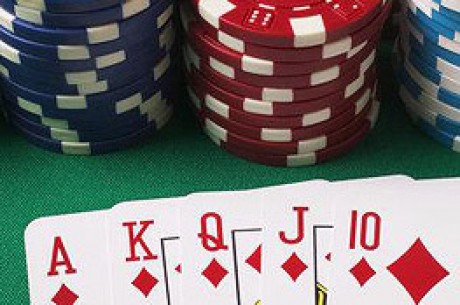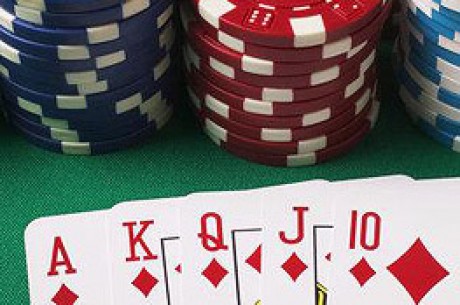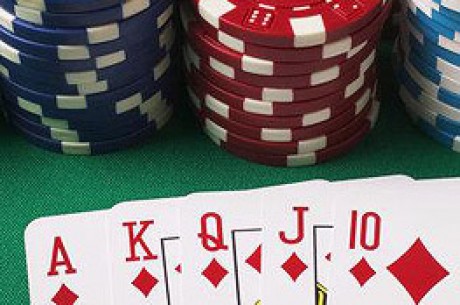Stud Poker Strategy - Slowplaying

Slowplaying is a useful strategic weapon in Stud, though it is used too often by inexperienced or otherwise weak players. It is the act of deliberately not betting or underbetting your hand that you believe is so strong that it can withstand the giving of a free or reduced priced card to your opponent. It is, in its purest form, an act meant to seduce your opponents into continuing to play - for fear that if you bet your hand for value your opponents would fold and you would lose an opportunity to extract more money from them on later streets of betting.
Here is the classic example of a slowplay as it is usually and incorrectly used in 7-Card Stud.
You are playing $5/10 Stud. You are dealt (Ah 6s) Ad. You are in early position. You are playing against a standard line up of loose passive players. The 3c to your immediate right brings in the bet for $2.00. You think about raising but you fear driving out all of the other players. So you just call for $2.00 hoping that a bunch of other players will call after you.
That call of $2.00 is a slowplay. Were you betting your hand for value you would have completed the bet by raising to $5.00. You didn't raise because you deliberately wanted to let in other players, running the risk that they might improve on the next card but willing to let them because your hand of a pair of Aces seemed so strong.
This is a slowplay - and it is usually a mistake in the typical low or medium stakes 7-Card Stud game. It is a mistake because you want to knock out nearly all of your opponents when you hold a pair of Aces or any other Premium Pair on Third Street. Though your pair of Aces is likely to be the best hand at the time, it is not so strong as to do well with many callers on Third Street. It does much better if you can narrow the field to, ideally, one other caller. The call of the $2.00 forced bet is unlikely to accomplish that. And so a raise is usually the better move - especially when you are in a field of poor loose and passive players who are less likely to fold for a raise anyway.
Slowplays are useful when you are extraordinarily strong. When you have high trips on Third Street you may want to slowplay by just calling the bring-in or, even better, calling someone else's completion. With Trips you are not nearly as concerned about getting a lot of callers because the hand is likely to hold up all the way to the River, even against many callers. You are likely to remain the best hand no matter how many opponents you have. Your greater concern is making as much money as possible - not wanting to knock everyone out with a raise or re-raise on Third Street.
But even Trips shouldn't be routinely slowplayed on Third Street. If the Trips are lower or if the players are loose the best strategy may be to raise with Trips on Third Street - betting them for value as if they were a Premium Pair. A slowplay may end up hurting your ability to extract more money - since many bad players are more likely to play if they put money in early in the hand.
There's one hand that absolutely must be slowplayed. If you are fortunate enough to make Trips on Fourth Street you surely want to slowplay it by checking if no one else bets and just calling if someone else initiates the betting. While it may seem obvious that you are slowplaying your hand when you pair your door card on Third Street, that's OK. You 're not looking to disguise the fact that your hand is strong - though it would be nice if some of your opponents believed that you only had the exposed pair. You realize that most players will put you on Trips and assume that you're playing them slowly to seduce them into playing later. But you still slowplay them because you really want your opponents to improve. You want them to make a hand that is either better than trips or that is a draw to a hand better than trips - in the hope that they'll keep playing when you bet on Fifth or Sixth.
Similarly, if you hit Trips on Fifth Street by making Trips on the board and you don't put your opponents on anything stronger than a pair or lower Trips then by all means slowplay that monster. Your opponents will assume that you're slowplaying because of your trips. But you don't care. You just want to make sure they have a chance to catch their Flush or even their Full House on Sixth Street - so you can extract more money from them.
I generally discourage players from slowplaying anything lower than a Full House on Fifth Street. When you make a Flush you'll have three exposed suited cards and your opponents will presume you'll bet whether you made the hand or not. Might as well give yourself a chance to make some money on Fifth Street against those who doubt you and think that you're just betting on the come and hoping for the Fifth suited card on Sixth Street or the River. So I bet those Flushes and Straights on Fifth. Same thing with Trips. I'm betting them for value and not giving my opponents any free cards that might come back and bite me if they catch a Flush or a Straight on Sixth Street or the River.
Used selectively, slowplays can win the good player some extra bets in 7-Card Stud. But you have to be careful about not overdoing it. One pot lost because of a free card given to a player who improved and beat you depletes the advantages of many extra bets won with a well time slowplay. So save the slowplays for the truly monster hands.








